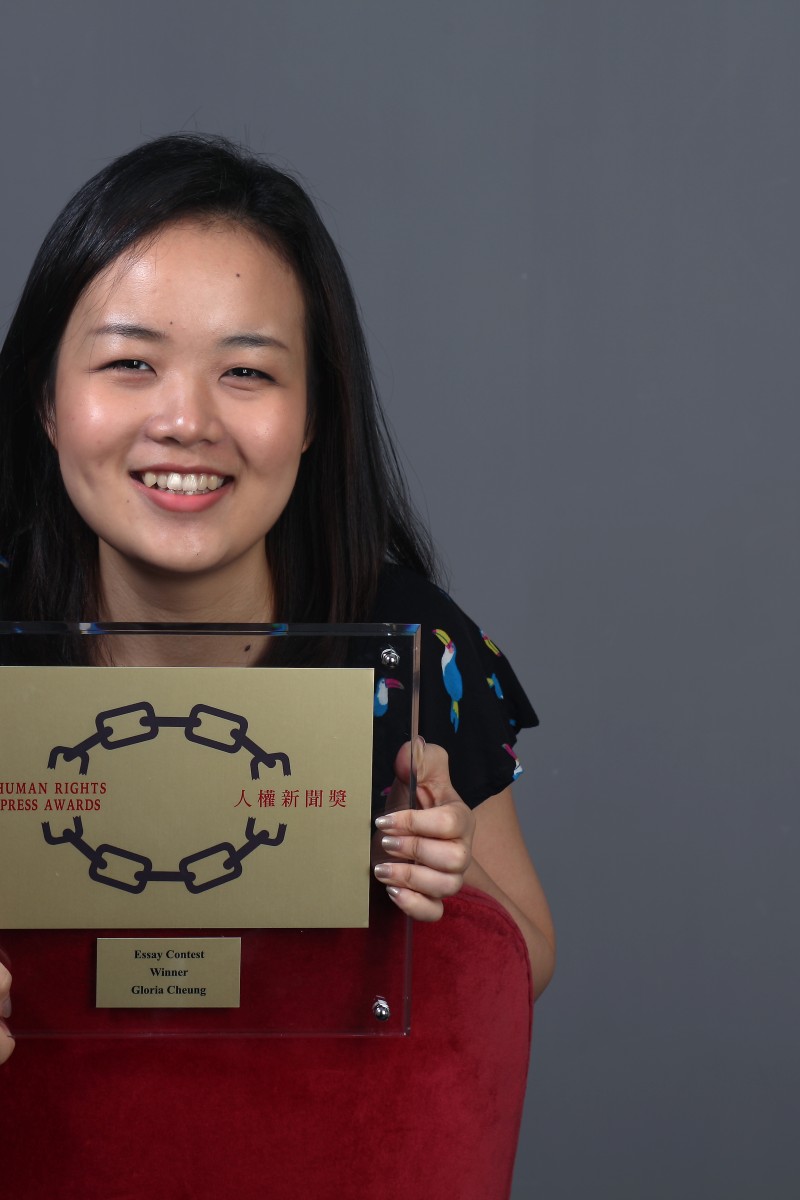 Former YP junior reporter Gloria Cheung wins the inaugural Human Rights Press Award essay award.
Former YP junior reporter Gloria Cheung wins the inaugural Human Rights Press Award essay award.Gloria Cheung graduated from the University of Hong Kong with a bachelor's degree in journalism, and has worked at some top news organisations, including CNN and Voice of America. She co-founded the Facebook page "LIVE: Verified Updates" during the Occupy Central movement, which reached 112,000 "likes". And just last weekend, she collected an award to add to her already impressive CV - the inaugural Human Rights Press Award essay award.
"I'm just really honoured to be recognised by such a respected human rights organisation, and it really encouraged me as a journalist to work harder and pursue excellence in reporting," she told Young Post.
Meeting some of the best reporters at the Annual Human Rights Press Awards ceremony also motivated her to continue being a journalist. "I was in the same room with so many respected reporters, and being in the same group with them [as an award winner], people I have enormous respect for, really made a huge impression on me," said Cheung.
"The biggest impression was made by Kevin Lau [Chun-to], the former Ming Pao chief editor who got stabbed [in an attack last February]. He suffered so much and still cannot walk properly, so seeing people like him is really inspiring."
The Human Rights Press Award essay contest required entrants to write about an art work or film related to human rights. Inspired by the documentary Citizenfour, Cheung wrote about surveillance. The documentary, which won the Best Documentary Feature at this year's Oscars, tells the story of whistleblower Edward Snowden and the NSA spying scandal, something Cheung remembers vividly.
"I was starting my internship at CNN at that time, and the whole news room was crazy. I remember the first thing my boss said to me was 'Do you know where Edward Snowden is?'" (No, she didn't). "That incident was memorable, so when the documentary came out, I really wanted to watch it and know what actually was happening."
As well as having front row seats to one of the biggest stories this decade, training as a journalist has given her a wide range of unexpected experiences.
"Last summer I went to London to make a documentary about underprivileged drama students ... and I also got to speak to Filipino domestic helpers at an illegal rooftop structure - they pooled money to use it on their one day off - about the Right of Abode issue. And of course, there's Occupy Central," recalls Cheung. "I wouldn't have got to experience these things if I wasn't a journalist."
Reporting presented her with another incredible opportunity when she travelled abroad for the first time to New Zealand as a junior reporter for Young Post.
"Sue [the Young Post editor] had this reporting opportunity where a junior reporter could follow a group of students on a study trip in New Zealand, and some magic happened and Young Post chose me," said Cheung. "A normal teenager in Hong Kong wouldn't have been able to go to a place like that."
So, looking back, what does the journalism graduate from one of the best universities for journalism in the city, and the first-ever Human Rights Press Award essay winner, have to say to aspiring journalists? Join Young Post's Junior Reporters' Club.
"This is from my heart, I'm not just saying this because [you're from Young Post], but really, junior reporters is a good place to start," said Cheung sagely. "It's a place to try it out and decide whether you'll like journalism or not. It's so free and flexible, you get to do all sorts of assignments and see if it's a good fit for you. It's a real privilege!"
To join Young Post's Junior Reporters' Club, simply click here.
